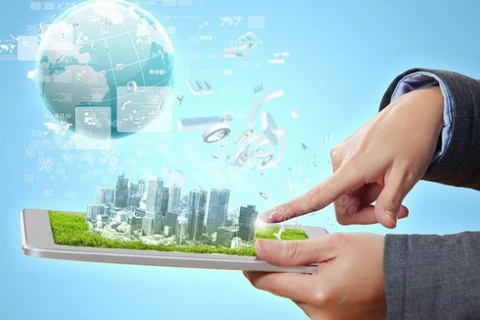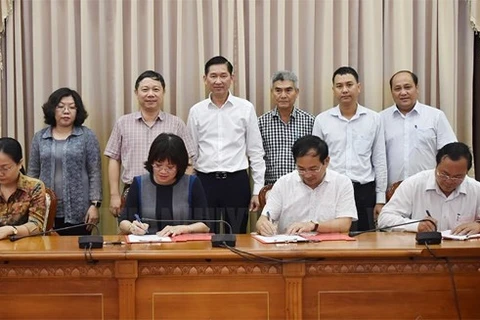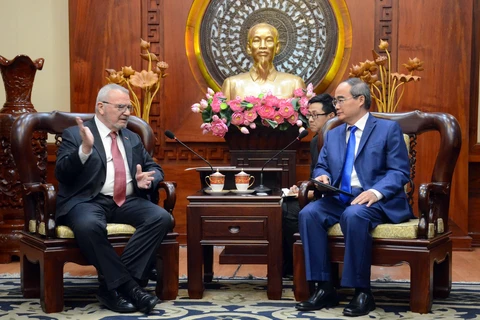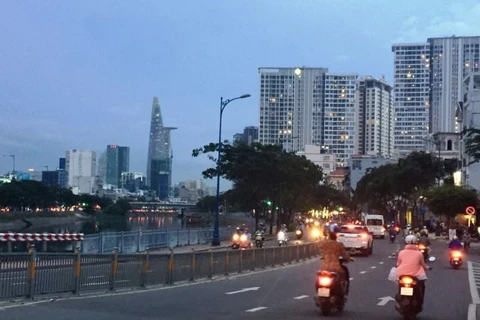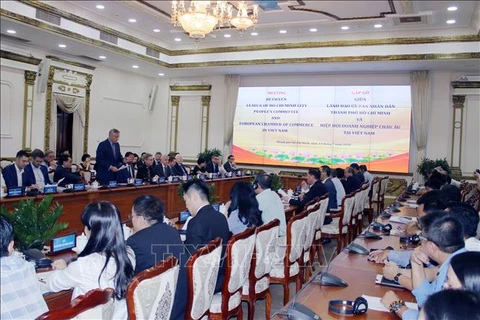HCM City (VNS/VNA) - To achieve smart-city status, at least 90 percent of residents in Ho Chi Minh City should be using a smartphone by 2022, a top official said at a communications conference held in the city on July 16.
Nguyen Manh Hung, Minister of Information and Communications, said that smartphones were being used by only 60 percent of people in the city that leads the country’s telecommunications industry.
To improve the city’s economy and solve its urgent problems, the use of new technologies must be promoted more aggressively by the city authority, he said.
The city should also aim to have all households connected to the internet so that a foundation for an e-government can be built, he added.
Hung said the city would have 5G internet available in research areas, industrial parks and universities by 2020 and throughout the entire city by 2022.
“We cannot develop a smart city and build an e-government unless all people have smartphones and access to the internet,” he said.
In an earlier meeting, Hung called upon local technology giants Viettel, Vingroup and FPT to manufacture 5G devices by 2020.
He said the country had an ambitious goal to produce 5G equipment to serve local demands and for export.
Speaking at the conference, Nguyen Thien Nhan, Secretary of the HCM City Party Committee, said that city leaders had met with businesses to discuss cooperative efforts to build smart urban areas and creative urban areas.
The city has given priority to growing in a sustainable manner and providing full public services to residents.
He said a smart city would improve the living environment and economy, as well as reduce pollution.
“More importantly, with a smart city, residents will play a critical role in supervising Government activities,” he said.
Nhan said that HCM City had already launched major components for smart urban areas, including the first phase of a common database and plan, a simulation and socio-economic-strategy forecasting centre, an information security centre, and e-government.
The database will include information about socio-economic development policies that can be accessed by businesses, citizens, managers and investors.
Nhan said that leaders and managers should be less reactive and more proactive by forecasting and preventing problems before they occur.
Among the initiatives, smart systems for traffic management, parking lots, toll collections and environmental management will provide updates on air, water, waste and noise parameters.
With a population of 10 million, the city should choose one key area to develop smart urban area first and then develop other areas later, he said.
Nhan recommended that the city focus on a new “innovative urban area” in District 9 in the city’s eastern part.
The eastern part of the city contributes 30 percent to the city’s GDP. The area has the highest density of high-tech training, research and application centres in the city.
Digital transformation
On July 15, the minister also had a meeting with representatives of businesses in HCM City, at which he said city businesses needed to make the digital transformation to remain competitive and enhance their value.
He said to encourage them to change from traditional to digital enterprises, the Government offers incentives such as permits to import technology products for research and development, tax breaks for IT experts and helping create links between businesses and universities to ensure a flow of high-quality human resources
Digital transformation is the process of changing from traditional models by applying new technologies such as big data, the internet of things and cloud computing.
"The transformation does not require businesses to invest in infrastructure but only to change their mindset," Hung said.
Digitisation changes operational and leadership methods as well as work processes and corporate culture, and could help enterprises increase their revenue by 30 percent while cutting costs by 30 percent, according to experts.
But not all companies in Vietnam are ready for it. The factors that preclude companies from digitising include lack of skills and resources and cybersecurity.-VNS/VNA
Nguyen Manh Hung, Minister of Information and Communications, said that smartphones were being used by only 60 percent of people in the city that leads the country’s telecommunications industry.
To improve the city’s economy and solve its urgent problems, the use of new technologies must be promoted more aggressively by the city authority, he said.
The city should also aim to have all households connected to the internet so that a foundation for an e-government can be built, he added.
Hung said the city would have 5G internet available in research areas, industrial parks and universities by 2020 and throughout the entire city by 2022.
“We cannot develop a smart city and build an e-government unless all people have smartphones and access to the internet,” he said.
In an earlier meeting, Hung called upon local technology giants Viettel, Vingroup and FPT to manufacture 5G devices by 2020.
He said the country had an ambitious goal to produce 5G equipment to serve local demands and for export.
Speaking at the conference, Nguyen Thien Nhan, Secretary of the HCM City Party Committee, said that city leaders had met with businesses to discuss cooperative efforts to build smart urban areas and creative urban areas.
The city has given priority to growing in a sustainable manner and providing full public services to residents.
He said a smart city would improve the living environment and economy, as well as reduce pollution.
“More importantly, with a smart city, residents will play a critical role in supervising Government activities,” he said.
Nhan said that HCM City had already launched major components for smart urban areas, including the first phase of a common database and plan, a simulation and socio-economic-strategy forecasting centre, an information security centre, and e-government.
The database will include information about socio-economic development policies that can be accessed by businesses, citizens, managers and investors.
Nhan said that leaders and managers should be less reactive and more proactive by forecasting and preventing problems before they occur.
Among the initiatives, smart systems for traffic management, parking lots, toll collections and environmental management will provide updates on air, water, waste and noise parameters.
With a population of 10 million, the city should choose one key area to develop smart urban area first and then develop other areas later, he said.
Nhan recommended that the city focus on a new “innovative urban area” in District 9 in the city’s eastern part.
The eastern part of the city contributes 30 percent to the city’s GDP. The area has the highest density of high-tech training, research and application centres in the city.
Digital transformation
On July 15, the minister also had a meeting with representatives of businesses in HCM City, at which he said city businesses needed to make the digital transformation to remain competitive and enhance their value.
He said to encourage them to change from traditional to digital enterprises, the Government offers incentives such as permits to import technology products for research and development, tax breaks for IT experts and helping create links between businesses and universities to ensure a flow of high-quality human resources
Digital transformation is the process of changing from traditional models by applying new technologies such as big data, the internet of things and cloud computing.
"The transformation does not require businesses to invest in infrastructure but only to change their mindset," Hung said.
Digitisation changes operational and leadership methods as well as work processes and corporate culture, and could help enterprises increase their revenue by 30 percent while cutting costs by 30 percent, according to experts.
But not all companies in Vietnam are ready for it. The factors that preclude companies from digitising include lack of skills and resources and cybersecurity.-VNS/VNA
VNA

